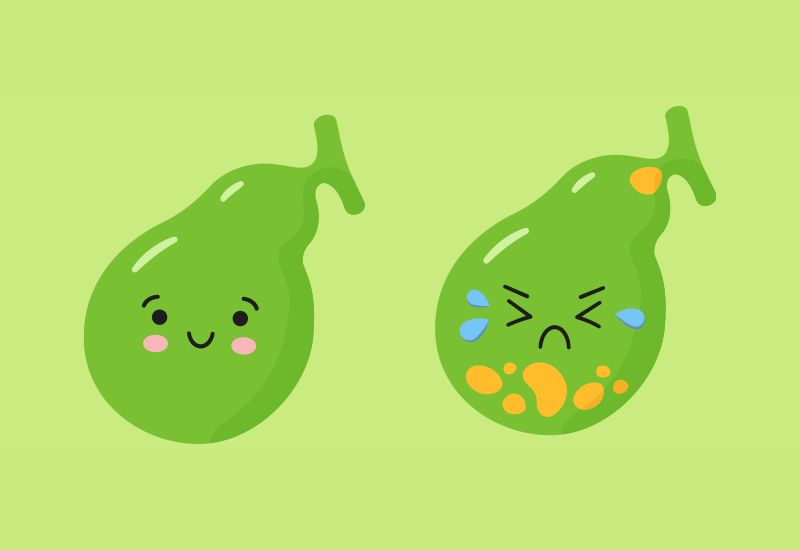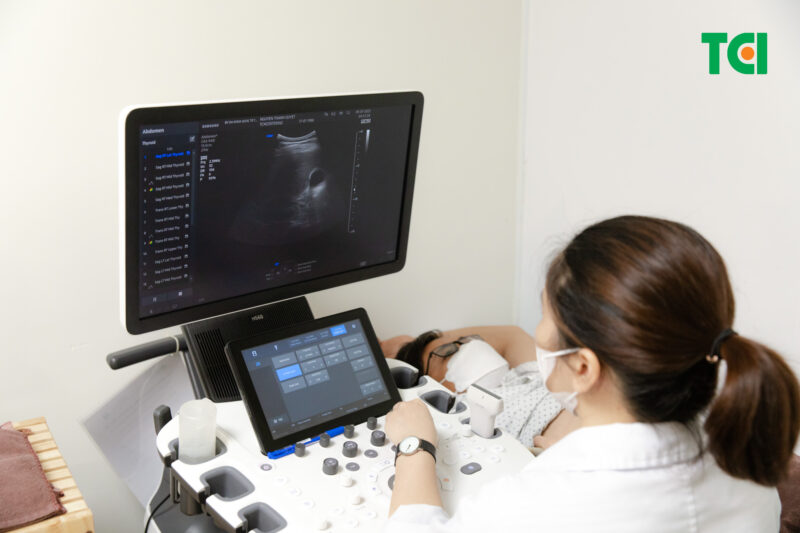Gallstones are becoming increasingly prevalent in modern society, significantly impacting patients’ quality of life and potentially leading to serious complications if not diagnosed and treated in a timely manner. In many cases, gallstones remain asymptomatic during the early stages, causing individuals to overlook the condition until complications arise. Therefore, understanding the causes of gallstones is crucial in facilitating early prevention, reducing the risk of stone formation, and minimizing treatment burdens.
1. How Gallstones Form
Before exploring the common causes of gallstones, it is important to understand their mechanism of formation. Gallstones develop primarily due to an imbalance in the composition of bile – a digestive fluid produced by the liver and stored in the gallbladder to aid in fat digestion. Under normal conditions, bile contains cholesterol, bile salts, and bilirubin in a stable ratio. When this balance is disrupted such as by increased cholesterol levels or reduced bile salts – solid crystals may form and gradually develop into stones.
In addition to chemical imbalances, gallbladder motility disorders such as reduced contractions or bile stasis can also contribute to crystal accumulation and stone formation. What’s noteworthy is that these imbalances often stem from common daily habits or underlying health conditions that many people tend to ignore until symptoms appear.
2. Common Causes of Gallstones
2.1 Metabolic Disorders and Underlying Diseases
A major contributor to gallstone formation today is cholesterol metabolism disorder. This is frequently observed in individuals with obesity, hyperlipidemia, fatty liver disease, or diabetes. When cholesterol levels in bile exceed the saturation point, cholesterol crystals readily precipitate and form stones. In the context of modern lifestyles characterized by high-fat diets and sedentary behavior, metabolic disorders have become increasingly common, and so has the prevalence of gallstones.
Additionally, chronic liver diseases such as cirrhosis, hepatitis, and hemolytic anemia can alter bile pigment composition, leading to the formation of pigment stones, which are rich in bilirubin. Conditions like bone marrow diseases, chronic biliary tract infections, and parasitic infestations (e.g., liver flukes) are also causes of gallstones, particularly in developing countries like Vietnam.
It is important to note that individuals with such medical conditions may not always be aware of their increased risk for gallstone formation. Effective management of underlying conditions, routine health checks, and regular follow-ups are essential in preventing or detecting gallstones at an early stage.

Cholesterol metabolism disorders raise the risk of gallstone formation.
2.2 Lifestyle and Dietary Habits
Poor lifestyle choices also play a significant role among the causes of gallstones and are often underestimated. A high intake of saturated fats, fried foods, and low consumption of fiber and vegetables can increase cholesterol levels and reduce gallbladder contractions. This leads to bile stagnation and promotes the crystallization process.
Skipping breakfast, irregular meals, or rapid weight loss can disturb the gallbladder’s regular contraction rhythm, allowing bile to remain stagnant. Inadequate water intake, smoking, excessive alcohol consumption, and long-term use of hormonal contraceptives have also been linked to a higher risk of gallstone development.
Pregnant women are especially vulnerable due to hormonal changes that slow gallbladder activity and increase cholesterol secretion. Hence, nutritional counseling during pregnancy is essential for gallstone prevention.

An unhealthy lifestyle and a diet high in saturated fats can increase the risk of gallstones.
3. Preventing Gallstones from the Root Causes
3.1 Addressing the Causes of Gallstones
Dietary adjustments are a fundamental preventive strategy. Adopting a balanced diet with appropriate portions of protein, fat, and fiber helps maintain healthy bile composition. Limit high-cholesterol and fried foods while increasing the intake of vegetables, fruits, and whole grains not only to reduce the causes of gallstones but also to manage associated chronic diseases.
Physical activity is equally important. Regular exercise supports metabolic function and stimulates gallbladder activity, preventing bile stasis. Avoid rapid weight loss regimens. Pregnant women or individuals on hormone therapy should undergo regular health evaluations to detect early abnormalities.
Routine medical checkups are advisable for individuals with risk factors such as obesity, diabetes, liver disease, or a family history of gallstones. Abdominal ultrasound is a non-invasive, accessible method that can detect gallstones even when asymptomatic, enabling timely intervention.

Regular health check-ups help detect gallstones early.
3.2 Small Changes, Big Impact
Many people believe gallstones are an inevitable part of aging, but in reality, most causes of gallstones are rooted in everyday behaviors. Simple changes such as staying hydrated, eating meals regularly, avoiding breakfast skipping, getting sufficient sleep, and limiting alcohol can significantly reduce the risk of gallstone formation.
A clear understanding of gallstones also helps avoid unnecessary anxiety and inappropriate treatments. Not all gallstones require surgery. However, if a stone is large or causes recurrent inflammation, gallbladder removal may be necessary. Early detection and monitoring are key to avoiding silent progression over the years.
In conclusion, gallstones are largely preventable if individuals recognize the causes of gallstones and proactively adjust their lifestyles. Understanding the formation mechanisms, identifying risk factors, and making informed choices are essential steps in safeguarding liver and gallbladder health. Today’s small adjustments can pave the way for a healthier digestive system and protection against gallstone-related complications.








